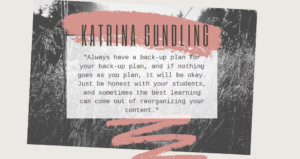
Developing Collaborative Skills through Pedagogical Example
Regardless of one’s academic discipline or the courses that we teach, college faculty members share a responsibility to prepare our students for success in our

Regardless of one’s academic discipline or the courses that we teach, college faculty members share a responsibility to prepare our students for success in our

Why did the chicken cross the road? To get to the other side. Why did the chicken cross the playground? To get to the other

Although Kathleen Koenig was terrified of public speaking as a student, she now teaches lecture classes with 135+ students. As an associate professor in the

Students from different walks of life converge in a classroom for learning. They have different capabilities and personalities, adding to the diversity that comes with

It’s that time of year when spooky stories emerge and haunted traditions appear! From ghost stories to pumpkin-carving competitions, we found a few colleges and

Years ago, when I began my full-time teaching career in the university classroom, I was a mere 27 years old and fresh out of a

Q: Why did the chicken cross the road? A: To show the squirrel it could be done. Most of us attempt to teach our subjects

One of the most popular guides for academic writing standards across the curriculum is scheduled for some changes. It’s been a decade since The American

The Focus is You will now occur just once a month. We have other exciting things to share with you on Thursdays, like our new,

As faculty, we want our students to achieve, but more than that we want our students to see, at least in some way, that what
Get exclusive access to programs, reports, podcast episodes, articles, and more!